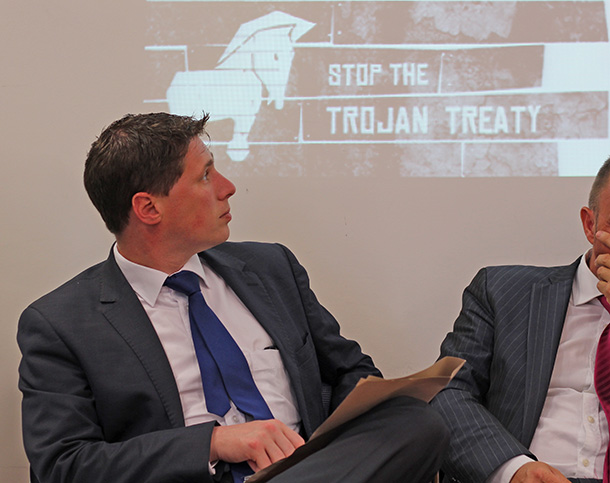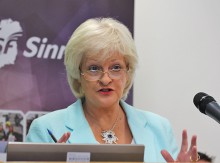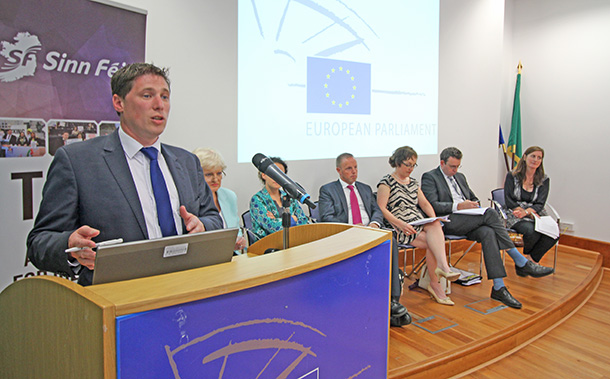21 July 2015
TTIP 'Trojan Horse' to undermine workers' rights and agriculture sector

Matt Carthy MEP at European Parliament House in Dublin
HE NEW free trade deal being negotiated between the EU and the US is a "Trojan Horse" which threatens Ireland's farming industry as well as workers' rights, environmental standards and food safety – a conference in Dublin heard on Monday.
Hosted by Sinn Féin spokesperson on TTIP, Matt Carthy MEP, he told the event that the postponement of the European Parliament vote and debate on the deal amid chaotic scenes in June was down to "huge public pressure" from right across Europe.
"Our Government seems intent on selling TTIP regardless of the effects it will have on our vulnerable sectors," he said.
 Speaking at the event, ICTU General Secretary Patricia King (pictured) was highly critical of the Investor States Disputes Settlement (ISDS) mechanism which allows private companies to sue Governments in a secret commercial court if Government's do anything to affect their profits:
Speaking at the event, ICTU General Secretary Patricia King (pictured) was highly critical of the Investor States Disputes Settlement (ISDS) mechanism which allows private companies to sue Governments in a secret commercial court if Government's do anything to affect their profits:
"If trade is sustainable it doesn't need a special mechanism to let big corporations come in and push and bully their way around," she said.
The ICTU leader is also worried about the possible lowering of workers' rights and food standards:
"Nobody has convinced me yet that this agreement hasn't the possibility of flooding Ireland and other markets we have access to with cheap US meat." she said.
This was also something Eddie Punch of the Irish Cattle and Sheep Farmers Association (ICSA) and James McCarthy of the Irish Farmers' Association (IFA) took issue with.
Eddie Punch (pictured) said Irish beef farmers are already squeezed in a marketplace dominated by big multi-national corporations:
 "One of the benefits of TTIP that is being touted is that it will mean cheaper products on shop shelves. Cheaper goods means cheaper beef, this isn't good for primary producers. In 1997 farmers got about 75% of the price of sales of beef, now it's about 30 – 40%. Further reductions will have serious effects on farmers' livelihoods and serious knock-on effects for rural communities."
"One of the benefits of TTIP that is being touted is that it will mean cheaper products on shop shelves. Cheaper goods means cheaper beef, this isn't good for primary producers. In 1997 farmers got about 75% of the price of sales of beef, now it's about 30 – 40%. Further reductions will have serious effects on farmers' livelihoods and serious knock-on effects for rural communities."
Speaking on animal welfare, food safety and traceability within the sector, James McCarthy of the IFA said:
"Our high standards have to be maintained. If US farmers want to come in here then they should have to jump the same hurdles I have to jump."
Natacha Congotti of Friends of the Earth Brussels outlined issues surrounding environmental protection which could be under threat from TTIP as it currently stands.
Explaining the importance of the precautionary principle, Natacha noted that in Europe chemicals and foodstuffs are only approved for use once they have been proven as safe for use after rigorous testing, conversely, in the US, chemicals are approved without such study and only banned if they are later found to be unsafe.
"One example is in the area of cosmetics, in Europe there are over 1,000 chemicals which are banned yet in the United States there are just about a dozen," she said.
She also highlighted that in states where an ISDS mechanism is in force, almost 60% of cases taken by corporations are against Government's over their stringent environmental regulations.
The ISDS mechanism is something the Irish Cancer Society, who commissioned their own report on TTIP, believe could give huge amounts of power to big tobacco companies.
 Kathleen O'Meara (pictured) of the Irish Cancer Society said that on issues such as the introduction of plain packaging for cigarettes, tobacco companies could win cases against government's via ISDS where only commercial interests are taken into account:
Kathleen O'Meara (pictured) of the Irish Cancer Society said that on issues such as the introduction of plain packaging for cigarettes, tobacco companies could win cases against government's via ISDS where only commercial interests are taken into account:
"Our argument has always been that public health trumps commercialinterests," she sad, "but the introduction of ISDS would set that at nought."
She also explained that this would aid alcohol companies while raising serious questions on issues such as health insurance, clinical trial data and the power ISDS would give to large pharmaceutical companies surrounding the life of patents for particular drugs and the use of generic drugs.
Finally, Siobhán O'Donoghue of Uplift.ie said that as soon as people began to read into what this deal could mean, the overwhelming majority opposed it:
"This is not about being anti-USA, it is about opposing the increase of corporate power."

Follow us on Facebook
An Phoblacht on Twitter
Uncomfortable Conversations

An initiative for dialogue
for reconciliation
— — — — — — —
Contributions from key figures in the churches, academia and wider civic society as well as senior republican figures





